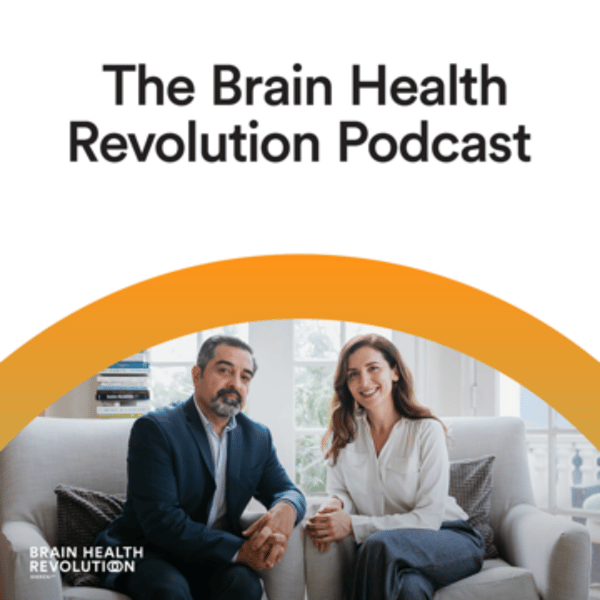Laxatives "Cause" Dementia? A Discussion and Review of The Latest Research
The Brain Health Revolution Podcast
Dean and Ayesha Sherzai
4.8 • 604 Ratings
🗓️ 16 March 2023
⏱️ 44 minutes
🧾️ Download transcript
Summary
This episode was part of a live discussion in the Science Club of the NEURO Academy. We discussed the recent article that showed an association between laxative intake and dementia, and critically analzed the methodology and the results for the audience. We then answered their questions.
Reference:
NEURO Academy is a membership based online environment where you’ll have access to resources to achieve optimal health, a better, sharper memory, and prevent cognitive decline. The platform provides the opportunity to connect with us and an empowering community and participate in weekly live Q&A sessions, live cooking sessions, live podcasts and Q&A with remarkable health leaders, have access to on demand courses on prevention of neurological diseases, expanding the course to evidence based nutrition and cooking, anxiety, and many others on various topics related to brain health. We just released a comprehensive course of evidence based nutrition in brain health, along with a complete cooking course that will help you learn the basics of healthy eating and how you can apply all the knowledge by improving what’s on your plate. You will be able to get CE or CME credits if you’re interested, and also receive certification after taking the course. Join us by visiting NEUROacademy.com.
Follow us:
Join the NEURO Academy: NEUROacademy.com
Follow us on social media:
Instagram: The Brain Docs @thebraindocs
Facebook: The Brain Docs
TikTok: @thebraindocs
Website: TheBrainDocs.com
Transcript
Click on a timestamp to play from that location
| 0:00.0 | Hello everyone. I hope you're all doing well. Good afternoon. Good evening. Good morning. |
| 0:11.0 | Wherever you are. It's great to connect with you again. Welcome to this new segment that we just added, Neuroacademy's discussion of the week. |
| 0:19.0 | And for today's discussion, we're going to |
| 0:21.1 | take a paper that was published last week. And it was quite an interesting topic, the use of |
| 0:28.0 | laxatives and risk of dementia. And since this is neuroacademy, and we're all trying to learn more |
| 0:34.0 | and more about brain health. And especially when it comes to our science, |
| 0:39.2 | the neuroscience club, we want to dive in deeply into the latest information, the latest science |
| 0:46.1 | on brain health and lifestyle. And I thought this was a very interesting topic to talk about. |
| 0:50.8 | It is. I mean, this is almost like a per-phenomenon, laxatives and brain health, |
| 0:56.7 | and it gives us so much information in regards to medication and brain health, and also how |
| 1:02.8 | science has looked at, because this paper is quite telling of some flaws and some insights that data can give us. |
| 1:13.4 | And so we wanted to kind of use this as a means of better elucidating, better identifying |
| 1:19.0 | this relationship between medication and brain help. |
| 1:22.8 | Yeah, and I think every time we dive into a scientific article or we talk about relationships, we don't |
| 1:30.2 | talk about just that relationship. |
| 1:31.6 | We actually learn how to read scientific articles and how to assess them. |
| 1:36.3 | Because as you know, just like the erythraitol people, which was just sensationalism, it's |
| 1:41.5 | important for us to be comfortable with finding out or delineating |
| 1:48.0 | between good data and poor data. I was listening to somebody speak about, you know, |
| 1:54.6 | understanding where we are in history. It's about getting comfortable with complexity, and complexity is never black and white. It's gray and it's it's about getting comfortable with complexity and complexity is never |
| 2:02.5 | black and white it's gray and it's evolving and that's something that humanity is not comfortable |
| 2:08.3 | genetically we're not comfortable with that because we we want the absolute survival value yes or |
... |
Please login to see the full transcript.
Disclaimer: The podcast and artwork embedded on this page are from Dean and Ayesha Sherzai, and are the property of its owner and not affiliated with or endorsed by Tapesearch.
Generated transcripts are the property of Dean and Ayesha Sherzai and are distributed freely under the Fair Use doctrine. Transcripts generated by Tapesearch are not guaranteed to be accurate.
Copyright © Tapesearch 2025.

